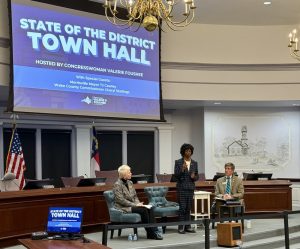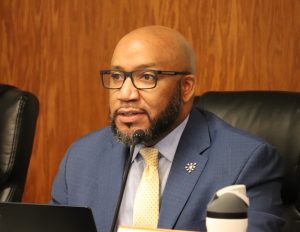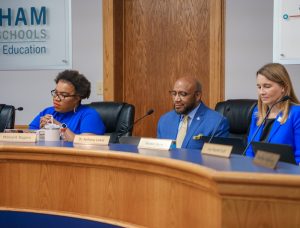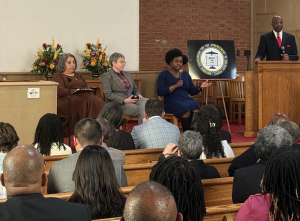By early evening on Tuesday, the daylong rain in Durham had eased. And inside the Fuller Administration Building Boardroom at Durham Public Schools headquarters, all was sunshine as three figures stepped in front of TV news cameras, hailing what they called a historic achievement.
Board Chair Millicent Rogers said she was “incredibly proud’’ of North Carolina’s first “meet-and-confer” policy, which gives district employees a voice in school board decisions—from budget requests to salaries for teachers.
At scheduled meetings, representatives from qualifying educator associations will discuss such issues with the board.
When it was her turn at the mic, Mika Hunter Twietmeyer, president of the Durham Association of Educators, called the policy “historic, visionary, and inspiring.” And DPS Superintendent Anthony Lewis lauded it as potentially “transformational” because it will allow teachers and school system leaders to “confer collaboratively about issues that are critically important to our student success and staff morale.” Along with Rogers, four of the board’s seven members showed up for Tuesday’s press conference, sitting on the dais.
Tuesday’s show of unity was in stark contrast to the bitter exchanges that marked last Thursday’s board meeting. What was billed as a 30-minute discussion of the meet-and-confer policy turned into a two-hour debate peppered with barbs and accusations.
Joy Harrell Goff said the group had “trust issues.” Natalie Beyer accused a colleague of being dishonest. And Vice Chair Jessica Carda-Auten said Beyer was trafficking in misinformation.
The board, which had passed a version of the policy in April, sought to amend it as about 20 DAE members looked on, clad in red t-shirts. Although the board eventually passed an amended policy, the path to approval was tense and torturous.
“This has been the most divisive issue for our community,” Beyer said during the meeting.
Board member Emily Chávez opened the discussion by introducing three areas of clarification that she championed along with Harrell Goff and Carda-Auten. This sparked confusion among Beyer, Bettina Umstead, and Wendell Tabb, who said their colleagues had not given them a chance to review the changes before the meeting.
When Rogers suggested a recess, giving time for the new policy document to be uploaded to their software, some members agreed: “It’s just helpful for my brain to see the clean [document] and then to see the changes beside it just for me as a learner,” Umstead said.
Even this drew the ire of some board members. It took 15 minutes for them to decide.
Harrell Goff insisted that the amendments were minimal. The proposed changes:
- Included the definition of an employee representative organization (ERO).
- Would allow only groups representing at least 11% of non-administration employees to be part of meet-and-confer. In April, the board approved a 6% threshold. (DAE reportedly represents more than 50% of the district’s workers.)
- Would permit a third-party certification process to determine which EROs would qualify for meet-and-confer.
Overall, the changes would have strengthened the DAE’s ability to represent district employees before the board.
Still, members of the board were puzzled. Rogers attempted to clarify what she had heard from Harrell Goff. “Do not put words in my mouth,” Harrell Goff shot back.
After a ten-minute recess that turned into 23 minutes, the board reconvened to discuss the amendments.
Although some board members wanted to approve the changes that evening, and others wanted time to consider the details, the group was largely in agreement about the policy itself. And yet, the tensions rose.
Beyer pushed for the opportunity to discuss the changes with legal counsel and wanted to table the issue until the next meeting. Her more enthusiastic colleagues greeted her suggestion with hostility. So did the audience, which let out whispers and groans of disapproval.
Tabb also sought clarity from the board’s attorney, Rod Malone. In an awkward ten-minute aside, Tabb seemingly asked the same question repeatedly, to which Malone repeatedly gave him the same answer.
On the other hand, Carda-Auten believed this issue did not need further debate. “I am a little confused about why this is such a contentious issue,” she said. Moments later, she added: “I don’t know why we’re arguing over something that just feels natural.”
Umstead had remained silent on the policy until now, part of her face covered with a black surgical mask. She removed it and spoke with deliberation and frustration: “What actually is upsetting me, is that I received a policy five minutes ago,” she said. Umstead needed time to study the document. “And now it’s like, if I don’t pass it tonight, I am an issue,” she said.
Her colleagues’ actions upset her personally. “And it feels as though some of us aren’t valued on this board,” she said.
Hearing Umstead’s concerns (among others), Harrell Goff took five and a half minutes to address the discontent that had arisen. “I want to take a moment to acknowledge the harm, and apologize, and debunk this narrative that somehow, we [those who had proposed the changes] are not trying to be collaborative,” she said.
A few minutes later, her words quickened. She gestured and was emphatic: “I think that this whole thing is just tainted with all kinds of trust issues,” she said, and called to the audience to agree.
A surge of snapping, whistling, and chatter broke out in the audience.
The discission had moved from policy to personal.
In response, Beyer rejected the criticism of ‘trust issues’: “The notion that trust was broken, the notion that Ms. Chávez—you came out and said things weren’t collaborative [between DPS and DAE] at the beginning of your comments and frame that that way—that’s not helpful to this board. It really isn’t. And it’s not honest.”
Chávez leaned forward in her chair and spoke: “It wasn’t collaborative…. So, I don’t wanna hear about not being collaborative or being dishonest.”
Two hours into the debate, Beyer offered the San Antonio school system as an example of how third-party certification of EROs could work. Carda-Auten dismissed the comparison due to differences in the two cities’ meet-and-confer policies and their political dynamics.
“[I want to] not allow for misinformation to be released while we’re up here,” Carda-Auten said.
Eventually, Rogers shifted the discussion to a vote. The tally came to a 3-3 tie.
She asked for Umstead’s vote, as it had not yet been counted. Umstead took this opportunity to make some final remarks. She urged her colleagues to figure out how they could build trust among themselves, a matter that felt “urgent” and “important” to her.
“I feel like I lost my cool a little bit earlier and I apologize for that,” she added.
It was a conciliatory speech—one that appealed to both sides of the debate—but ultimately the fate of this motion was in Umstead’s hands. Earlier she had seemed skeptical of the policy changes, but in a surprising turn of events, she voted to pass the motion. The amended policy passed 4-3.
Not only had Umstead delivered the swing vote, but she had provided a plot twist, too.
“Oh my God!” said one audience member. “This is crazy!” said another. The DAE members whooped and cheered.
In low but excited chatter they dispersed, leaving only three spectators behind. The board then turned to the next agenda item—a consultant’s analysis of the school system’s maintenance issues, which may cost nearly $1 billion to address. That presentation and the ensuing discussion lasted only 40 minutes.
Paige Stevens







